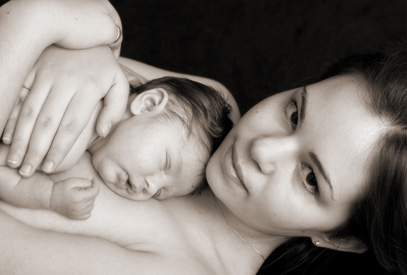Mothers’ obesity tied to newborn heart defects
The more obese a woman is when she becomes pregnant, the greater the likelihood that her baby will be born with a heart defect, a U.S. government study finds.
Using a database of births in New York State over a decade, researchers found that obese women were 11 percent more likely than normal-weight women to have a baby with a congenital heart defect.
Meanwhile, women who were morbidly obese - or about 100 pounds over their ideal weight - had a 33 percent higher risk than normal-weight women did.
Congenital heart defects are structural abnormalities of the heart that range from mild to life-threatening. The defects affect roughly eight in every 1,000 newborns, so, despite the relatively higher risk associated with mothers’ obesity, most infants born to obese women will not have a heart defect.
Last Updated: 2010-04-28 13:00:35 -0400
 Still, the researchers say their findings should give obese women more incentive to lose weight before becoming pregnant.
Still, the researchers say their findings should give obese women more incentive to lose weight before becoming pregnant.
“If a woman is obese, it makes sense for her to try to lose weight before becoming pregnant,” lead researcher Dr. James L. Mills, of the National Institute of Child Health and Human Development (NICHD), said in a written statement from the agency.
“Not only will weight loss improve her own health and that of her infant,” Mills said, “it is likely to have the added benefit of reducing the infant’s risk for heart defects.”
 The study, published in the American Journal of Clinical Nutrition, used data from a New York State registry tracking birth defects. Mills and his colleagues identified 7,392 infants born with a heart defect between 1993 and 2003, and compared them with 56,300 unaffected infants.
The study, published in the American Journal of Clinical Nutrition, used data from a New York State registry tracking birth defects. Mills and his colleagues identified 7,392 infants born with a heart defect between 1993 and 2003, and compared them with 56,300 unaffected infants.
Among newborns with heart defects, roughly 15 percent of mothers were obese before pregnancy, while 3 percent were morbidly obese. Those rates in the comparison group were 13 percent and just over 2 percent, respectively.
When the researchers accounted for other factors - such as mothers’ age, race, education level and smoking habits - obesity itself was still connected to the risk of newborn heart defects.
 Women who were overweight, but not obese, before pregnancy showed no increased risk.
Women who were overweight, but not obese, before pregnancy showed no increased risk.
Exactly why maternal obesity is linked to newborn heart defects is not clear.
Diabetes, which is closely associated with obesity, is known to raise the odds of birth defects, Mills and his colleagues note. However, the researchers analyzed women with and without diabetes both separately and together, and the excess risk linked to obesity remained stable.
Mills and his colleagues speculate that the “wide range of abnormalities” obesity can produce - from alterations in sugar and fat metabolism to changes in hormone activity - may be at work. They say that future studies should also look at the potential roles of diet habits during pregnancy and genetics.
The study does not prove that obese women who lose weight before pregnancy will lower their newborns’ risk of heart defects. But for now, “it is reasonable to assume” such benefits, according to the researchers.
“The current findings strongly suggest that by losing weight before they become pregnant, obese women may reduce the chances that their infants will be born with heart defects,” Dr. Alan E. Guttmacher, acting director of NICHD, said in the statement.
Previous studies have established links between mothers’ obesity and certain pregnancy complications and newborn health risks - such as pregnancy-related high blood pressure and diabetes, and other types of birth defects, including malformations of the spine and brain.
In the U.S., an estimated 20 percent of women are obese when they become pregnant, according to NICHD.
SOURCE: American Journal of Clinical Nutrition, online April 7, 2010.